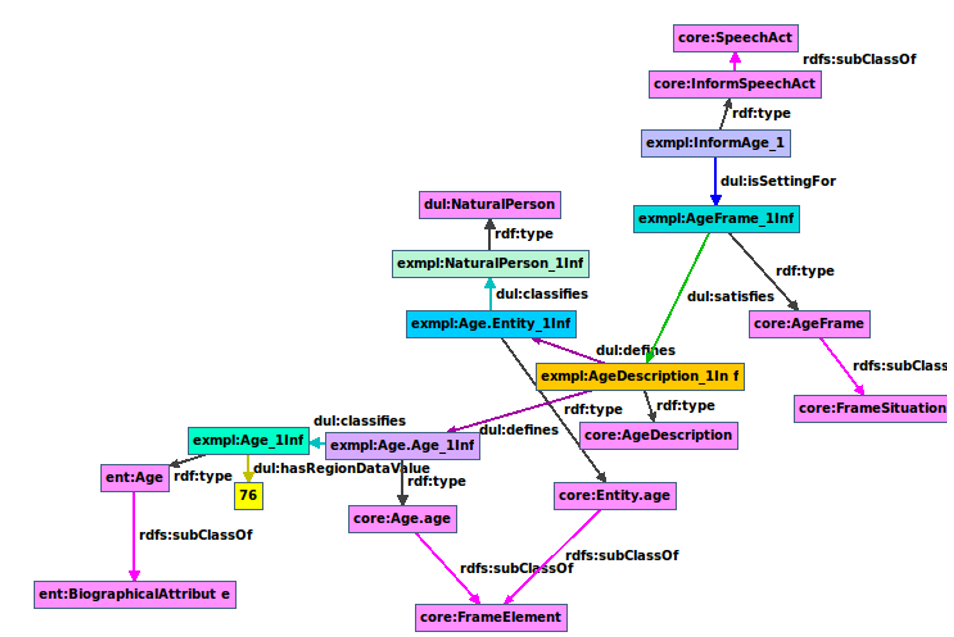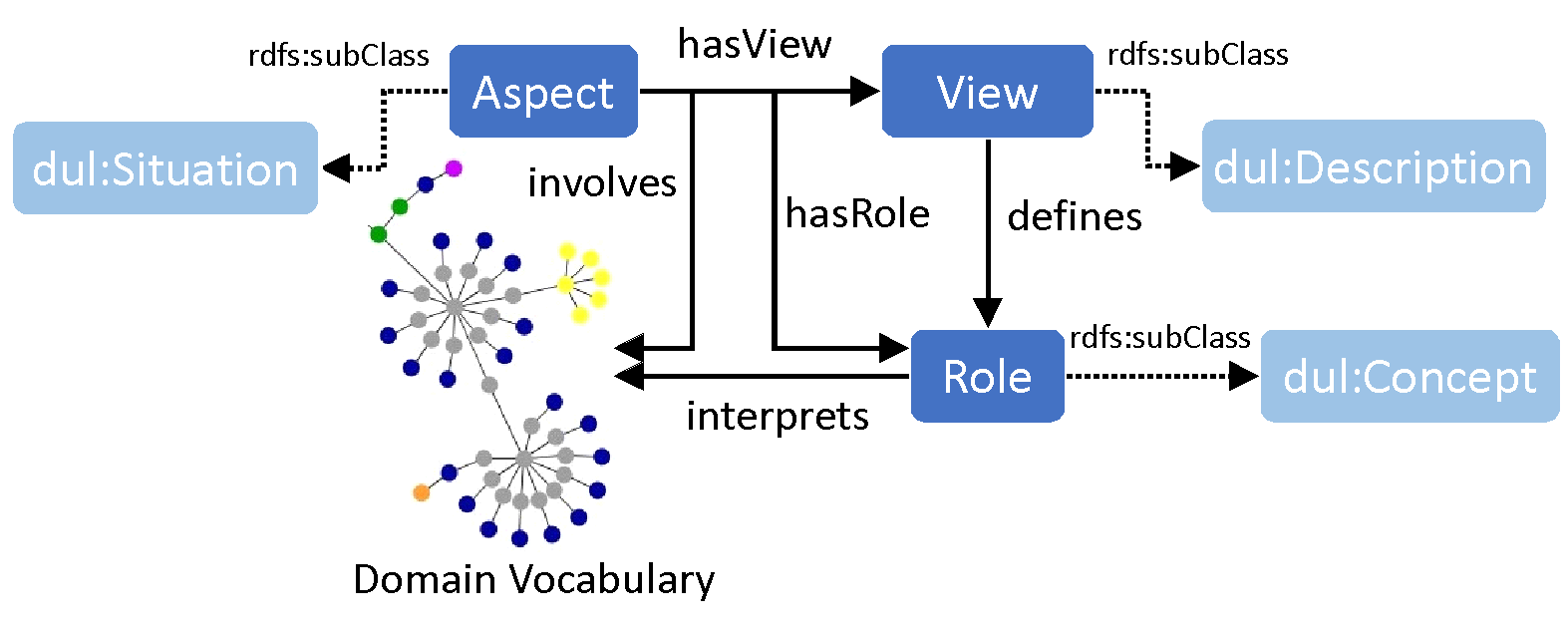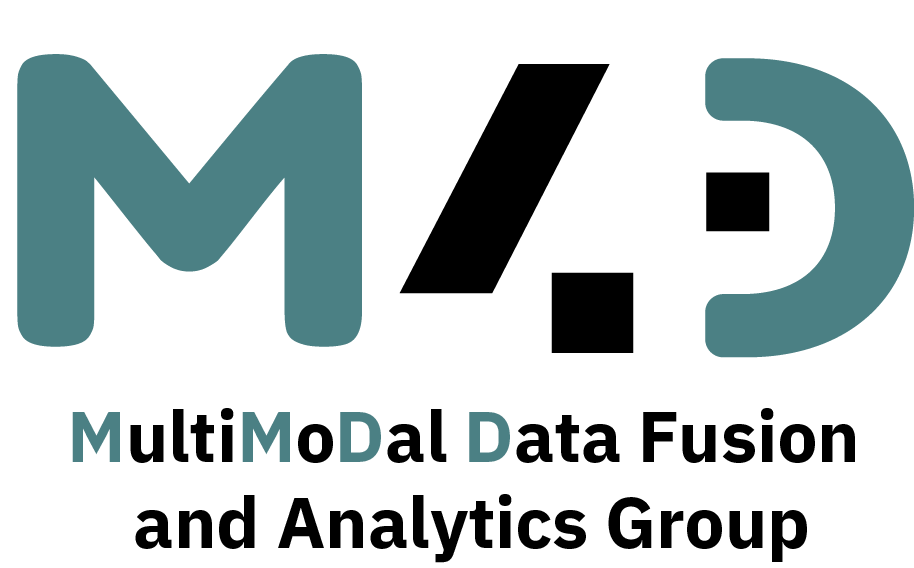KRISTINA Ontology: Modelling topic hierarchies and behavioural patterns in conversational agents
Recent years have witnessed important advances in natural language interfaces (NLIs) and Question Answering (QA) systems for structured data, exploiting ontological relationships to understand and disambiguate a query, inheriting relationships and linking word meanings across background knowledge and datasets. The key challenge in these efforts
is to bridge the gap between the way users communicate with the system and the way domain knowledge is captured, and more specifically to translate the questions expressed in natural language into structured queries. Towards this end, the KRISTINA project developed a number of ontologies to support knowledge integration, reasoning and fusion, coupling information distilled from the interaction with the user with domain and background information. These include ontologies to capture:
- The content of the conversation coming from communication of users with the system
- User profile information, e.g. preferences, habits, diseases, etc.
Conversational Topics
This ontology captures conversational topics (themes), which can be viewed as domain specialisations of the broader conversational topics that a user can have with the agent. This modelling layer fosters the design of a modular and reusable thematic ontology, allowing the grouping of similar topics under a common super-topic (theme) that can be used to provide advanced clarification dialogues, proactive responses and topic suggestions. In order to recognize conversational topics, the ontology semantically associates topics with domain concepts extracted through verbal and non-verbal information. Based on data coming from other modules, such as text analysis and gesture detection, we build the ongoing conversational context and use an ontology reasoner (native OWL 2 DL reasoning) to determine the topic.

Modelling routines, habits and behavioural preferences
The aim of the proposed patterns is to formally capture behavioural meta-knowledge, that is, the structural notions of events, preferences, habits (e.g. the frequency or duration of certain activities), their relations to domain entities and contexts (e.g. events involved), as well as to define operators among them, e.g. temporal or spatial. Towards this end, the ontology makes use of the meta-modelling capabilities of OWL 2, namely punning that allows treating domain concepts as instances, allowing property assertions to be made among domain concepts. In this way, the proposed patterns enable to formally represent contextualised views on complex situations, and afford reusable pieces of knowledge that cannot otherwise be directly expressed by the standard ontology semantics, e.g. temporal correlations among activities that are not connected in a tree-like manner.

For developing and deploying the ontologies we relied on the following tools:
- TopBraid composer for developing the ontology (use of meta-modelling capabilities);
- GraphDB for locally hosting test versions of the ontology;
- SPARQL served as the semantic query language for submitting queries to the ontology and running rules on top of the model;
License
Apache License 2.0
Publications
- Georgios Meditskos, Efstratios Kontopoulos, Stefanos Vrochidis, Ioannis Kompatsiaris, “Converness: Ontology-driven Conversational Awareness and Context Understanding in Multimodal Dialogue Systems”, Expert Systems 37(1), Special Issue on e-Health and Staying Smarter, 2020, https://doi.org/10.1111/exsy.12378
- Leo Wanner, Elisabeth André, Josep Blat, Stamatia Dasiopoulou, Mireia Farrús, Thiago Fraga, Eleni Kamateri, Florian Lingenfelser, Gerard Llorach, Oriol Martínez, Georgios Meditskos, Simon Mille, Wolfgang Minker, Louisa Pragst, Dominik Schiller, Andries Stam, Ludo Stellingwerff, Federico Sukno, Bianca Vieru, Stefanos Vrochidis, “Design of knowledge-based agent as a social companion”, Proceedings of the International Conference on Health and Social Care Information Systems and Technologies (HCist), Barcelona, Catalonia, November 2017, https://doi.org/10.1016/j.procs.2017.11.119
- Leo Wanner, Elisabeth André, Josep Blat, Stamatia Dasiopoulou, Mireia Farrùs, Thiago Fraga, Eleni Kamateri, Florian Lingenfelser, Gerard Llorach, Oriol Martínez, Georgios Meditskos, Simon Mille, Wolfgang Minker, Louisa Pragst, Dominik Schiller, Andries Stam, Ludo Stellingwerff, Federico Sukno, Bianca Vieru and Stefanos Vrochidis. “KRISTINA: A Knowledge-Based Virtual Conversation Agent”, In International Conference on Practical Applications of Agents and Multi-Agent Systems (pp. 284-295). Springer, Cham, 2017 https://doi.org/10.1007/978-3-319-59930-4_23
- Georgios Meditskos, Stefanos Vrochidis, Ioannis Kompatsiaris, “Description Logics and Rules for Multimodal Situational Awareness in Healthcare”, Special session on Multimedia and Multimodal Interaction for Health and Basic Care Applications at MMM 2017, In International Conference on Multimedia Modeling, pp. 714-725, 2017, https://doi.org/10.1007/978-3-319-51811-4_58
- Georgios Meditskos, Efstratios Kontopoulos, Stefanos Vrochidis, Ioannis Kompatsiaris, “Ontology-Driven Context Interpretation and Conflict Resolution in Dialogue-Based Home Care Assistance”, In Proceedings of the 9th International Conference Semantic Web Applications and Tools for Life Sciences (SWAT4LS), Amsterdam, The Netherlands, CEUR Workshop Proceedings, 2016, http://ceur-ws.org/Vol-1795/paper1.pdf
- Georgios Meditskos, Stamatia Dasiopoulou, Stefanos Vrochidis, Leo Wanner, Ioannis Kompatsiaris, “Question Answering over Pattern-Based User Models”, In Proceedings of the 12th International Conference on Semantic Systems, pp. 153-160. ACM, Leipzig, Germany, September 12-15, 2016, https://doi.org/10.1145/2993318.2993331
- Georgios Meditskos, Stamatia Dasiopoulou, Louisa Pragst, Stefan Ultes, Stefanos Vrochidis, Ioannis Kompatsiaris, Leo Wanner, “Towards an Ontology-Driven Adaptive Dialogue Framework”, In Proceedings of the International Workshop on Multimedia Analysis and Retrieval for Multimodal Interaction, pp. 15-20. ACM, 2016,https://doi.org/10.1145/2927006.2927009
Related Projects
- REA
- KRISTINA
Ontologies (links)
https://drive.google.com/drive/folders/1Fr0e-5ppHCERLLOOrfrV1Z227tw0xb_i?usp=sharing
Contact
- Maria Rousi: mariarousi@iti.gr
- Georgios Meditskos: gmeditsk@iti.gr
